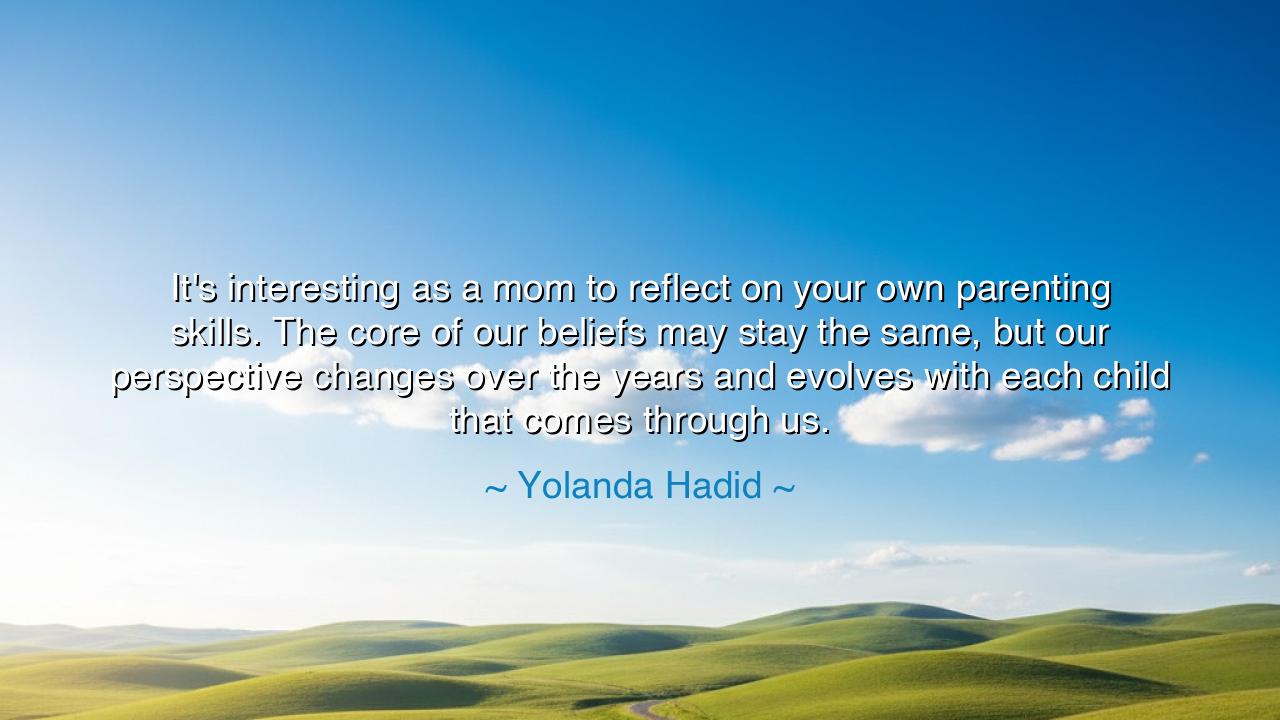
It's interesting as a mom to reflect on your own parenting
It's interesting as a mom to reflect on your own parenting skills. The core of our beliefs may stay the same, but our perspective changes over the years and evolves with each child that comes through us.






When Yolanda Hadid spoke: “It’s interesting as a mom to reflect on your own parenting skills. The core of our beliefs may stay the same, but our perspective changes over the years and evolves with each child that comes through us,” she revealed a truth that is both ancient and eternal. For the work of parenting is not a fixed path but a living journey. The heart of a parent begins with certain convictions — love, protection, guidance — yet as the years unfold and as each child enters the world with their own spirit, the parent is transformed.
The core beliefs are like the roots of an old oak tree. They remain anchored deep in the soil: the conviction that love must be given, that safety must be ensured, that dignity must be preserved. Yet the perspective, like the branches, grows and bends toward the shifting sun. With one child, the parent learns patience; with another, courage. With the first, the fear of inexperience may weigh heavily, but with the second or third, a gentler wisdom tempers the heart. Hadid reminds us that parenting is not static but evolving, shaped by time and by the unique souls entrusted to our care.
In the annals of history, consider Queen Victoria, who bore nine children. At the beginning of her motherhood, she was often strict and unyielding, clinging tightly to rules and expectations. But as more children were born, and as she matured with age, her approach softened in places and hardened in others. She did not abandon her principles, yet her methods adapted to each child’s nature. This is the very essence of Hadid’s reflection: parenting is not the repetition of a formula, but the evolution of perspective.
The wisdom here is deeply emotional: each child is not only born of the parent, but also rebirths the parent anew. When the second child arrives, the parent realizes that what worked for the first may not work again. When the third arrives, the parent’s eyes have seen even more of life’s complexity. Thus, each child becomes both student and teacher, shaping the parent as much as the parent shapes them. This sacred exchange is the hidden miracle of parenthood: it is a school in which both generations are learning together.
Yet this truth also humbles us. For many believe that parents should be masters from the beginning, certain in their methods. But Hadid’s words remind us that mastery is not immediate; it is the slow ripening of the soul. To reflect on one’s parenting skills is to admit imperfection, to acknowledge growth, and to embrace the changing tides of life. What once seemed vital may, over time, prove less important. What once felt small may, in later years, be revealed as central.
The lesson, O listener, is this: do not fear the evolution of your perspective. Hold fast to your core beliefs — the roots of love, respect, and responsibility — but allow your branches to bend with time. Let each child teach you something new. Reflect often on your journey, for self-reflection is the parent’s compass, guiding you through mistakes, triumphs, and second chances. A rigid heart will break, but a heart willing to evolve will endure.
Practical actions must follow: set aside moments of reflection, asking yourself how your parenting has changed and why. Speak openly with your children as they grow, acknowledging that you too are learning. Be willing to adjust your methods without shame, knowing that flexibility is a mark of wisdom, not weakness. Above all, honor each child as a unique soul, deserving of a path tailored to their spirit, even as you remain grounded in the unchanging roots of your values.
Thus, Hadid’s words stand as a torch to guide future generations: beliefs remain, perspectives evolve, and parenting is a lifelong journey of reflection and growth. To raise children is not only to nurture their becoming, but to allow yourself to be remade, again and again, through the gift of their presence. This is the sacred dance of the parent and the child: ever-changing, ever-growing, and ever bound by love.






AAdministratorAdministrator
Welcome, honored guests. Please leave a comment, we will respond soon